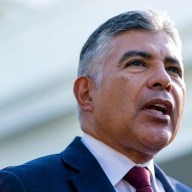Resist the urge to use your credit card in place of money you don’t have.
With the winter chill in the air it’s hard to ignore the fact that the holidays are fast approaching. Along with the expected yuletide feasts and warm toasty fires is the much dreaded hit to one’s bank account.
“The temptation to live and spend beyond one’s means can be great,” says Howard Kabot, CFP national director of financial planning for Scotiabank. “The young professional or graduate needs a good understanding of their weekly, monthly and annual take-home pay. Everyone should have a lifestyle budget with built-in savings.”
Developing good budgeting habits is still fairly new for many young professionals. Learning to watch one’s income carefully and planning accordingly before it’s all blown away on a few nights on the town is important, which puts newbie money makers at particular risk during the holiday season since we’re not accustomed to our cash flow just yet.
“Be realistic about what you can afford to spend,” suggests Kabot. “The most important thing to do is set a budget and then stick to it.”
Richard Wright, senior advisor and president of Alberta Wealth Management Inc., calls himself a realist.
“The truth is, I’m a realist and know by the time life and disability or even critical illness insurance is paid plus their RRSP’s, nonregistered investments and other tax deferred investments, there just isn’t a lot of extra money at end. I also dislike like bad debt — mortgage, credit cards, students loans and so on. Good debt, if there is such a thing, is tax deductible. So, in addition to saving I recommend paying off debt,” he says. “Most individuals set up a budget to get out of debt or save money. It is a financial tool.”
In terms of gift giving, Kabot suggests making a list of those who you would like to gift to and assign a dollar figure. Compare the total spent to your budget number. If you’ve gone over, go through your list once again to figure out what changes need to be made. Also, don’t forget to budget for entertainment. This type of spending usually increases at holiday time.
Don’t forget that tricky credit card. Make sure you can pay the bill when it arrives in January.
“Use the credit card for convenience, not in place of money that you really don’t have,” says Kabot. “Carrying credit card debt for more than two months is really an expensive and costly personal financial planning mistake.”
Once your budget and gift list is made start keeping an eye on the stores for the gifts on your list. You have time on your side so don’t be in a hurry to make an immediate purchase suggests Kabot.
“Look for sales. They are to be had, even this time of year.”
Finally make a budget for your holiday spending but make sure to track how you spend for day-to-day living as well. “Don’t feel obligated to spend lavishly on friends and family,” says Kabot. “These people in particular understand that young professionals or graduates are just starting their careers and as such, have limited incomes.”
Kavita Gosyne, 26, is a vibrant young journalist. She writes about her transition from student to employee and the issues she faces such as office politics.
| budgeting |
|
Howard Kabot of Scotiabank shares a few tips on how to create a budget you can stick to:
|
















